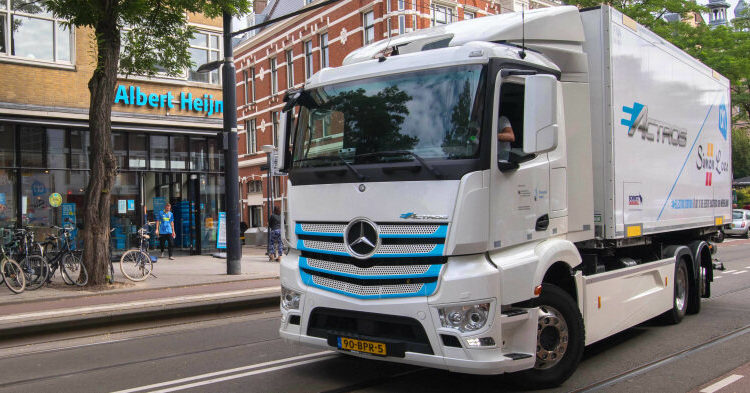- The first ten customers have each tested the Mercedes-Benz eActros intensively for about a year – additional customers are now successively starting further tests.
- Following trials in Germany and Switzerland, the eActros is now also being used for the first time by customers in the Netherlands and Belgium.
- Simon Loos is using a 25-ton eActros to supply supermarkets in the region of Rotterdam and The Hague for market leader in the Netherlands, Albert Heijn.
Stuttgart / Rotterdam, Netherlands – The starting signal for the second test phase of the Mercedes-Benz eActros “innovation fleet”: After about a year of intensive practical use by ten customers in Germany and Switzerland, eight of the purely battery-powered trucks are now successively going to new customers in Germany, Belgium and the Netherlands. They also will put the eActros through its paces in tough everyday transport operations for about a year. Two vehicles will continue the operational testing with customers in the first test phase. Simon Loos, a leading company for logistics services based in the Netherlands, will receive the first eActros of the second phase.
Andreas von Wallfeld, Head of Marketing, Sales and Services Mercedes-Benz Trucks: “We started the practical test of our eActros in September 2018 and have already covered hundreds of thousands of kilometers electrically. The findings from the first phase have made a valuable contribution to the planned start of series production next year. We are now testing our electric truck for its suitability in everyday use with new customers from various sectors in Germany and abroad. We are delighted that we can announce the start of the second wave of customers with Simon Loos.”
Locally CO2-neutral transport with Simon Loos: into a sustainable future with the eActros
Simon Loos is using an eActros equipped with a refrigerated box for the Albert Heijn supermarket chain. The daily tour of the eActros starts at Albert Heijn’s regional distribution center in Delfgauw in the province of South Holland. From there, the e-truck supplies supermarket stores in various cities in the region, including Rotterdam, The Hague and Delft, with dry goods and fresh, temperature-controlled food. The eActros will run seven days a week, covering around 200 kilometers every day in locally CO2-neutral operation. The batteries will be charged overnight and in between routes at the distribution center in Delfgauw, where Albert Heijn is currently constructing an innovative square with multiple fast-chargers. In preparation for the test, experts from Mercedes-Benz Trucks gave the Simon Loos drivers special training in the use of high-voltage systems.
Wim Roks, Fleet Manager, Simon Loos: “As the leading logistics service provider in the Netherlands, we naturally place great emphasis on sustainability in our strategy. We have been gaining experience with alternative drive systems in our fleet since 2014. With the practical test of the eActros, we are now taking another big step towards sustainable transport in the retail sector – together with Albert Heijn and Mercedes-Benz Trucks. We are looking forward to the experience we can gain with the vehicle over the coming months.”
Many findings from the first phase
One of the many findings gained during the practical tests in the first test phase is that the range of the eActros of approximately 200 kilometers has proven to be absolutely realistic – regardless of load, route or topography. The eActros is in no way inferior to a conventional diesel truck in terms of availability and performance in urban traffic, on highways or on overland routes. The cooling system for the cargo and the air-conditioning system – both electrically operated – functioned without any limitations in both extreme heat and winter conditions. Drivers are very pleased with the continuous availability of torque across the entire speed range. They also particularly mentioned the truck’s quietness in operation and the pleasant, smooth driving experience. Furthermore, if the truck is driven with foresight, electrical energy can be recovered through recuperation, i.e. motor braking. It is then rarely necessary to use the brake pedal.
Refrigerated swap body with electric refrigeration unit from Schmitz Cargobull
The cool swap body of the eActros used by Simon Loos is the W.KO COOL model from Schmitz Cargobull. It has optimized insulation for the energy-efficient transport of refrigerated goods and its robust construction is ideal for intensive daily use. The purely electrically operated refrigeration unit is completely emission-free in use and is specially designed for distribution transport. As was the case in the first test phase, the bodies of the vehicles will again be mainly provided by Schmitz Cargobull.
The eActros: locally CO2-neutral alternative for urban distribution transport
The eActros is based on the chassis of the Mercedes-Benz Actros. In addition, however, the vehicle’s architecture is completely geared to electric drive and has a high proportion of specific parts. Two electric motors close to the rear-axle wheel hubs provide drive with an output of 126 kW each and a maximum torque of 485 Nm each. This results in 11,000 Nm each after the transmission ratio, providing a performance equivalent to that of a conventional truck. Lithium-ion batteries with 240 kWh supply the energy for the eActros. Depending on the available charging power, the batteries can be fully charged within two hours (at 150 kW).
The development and testing of heavy-duty electric trucks in distribution transport is receiving support from Germany’s Federal Ministry for the Environment (BMU) and Federal Ministry for Economic Affairs and Energy (BMWi), as part of the Concept ELV² project.
Brummionline Presse

